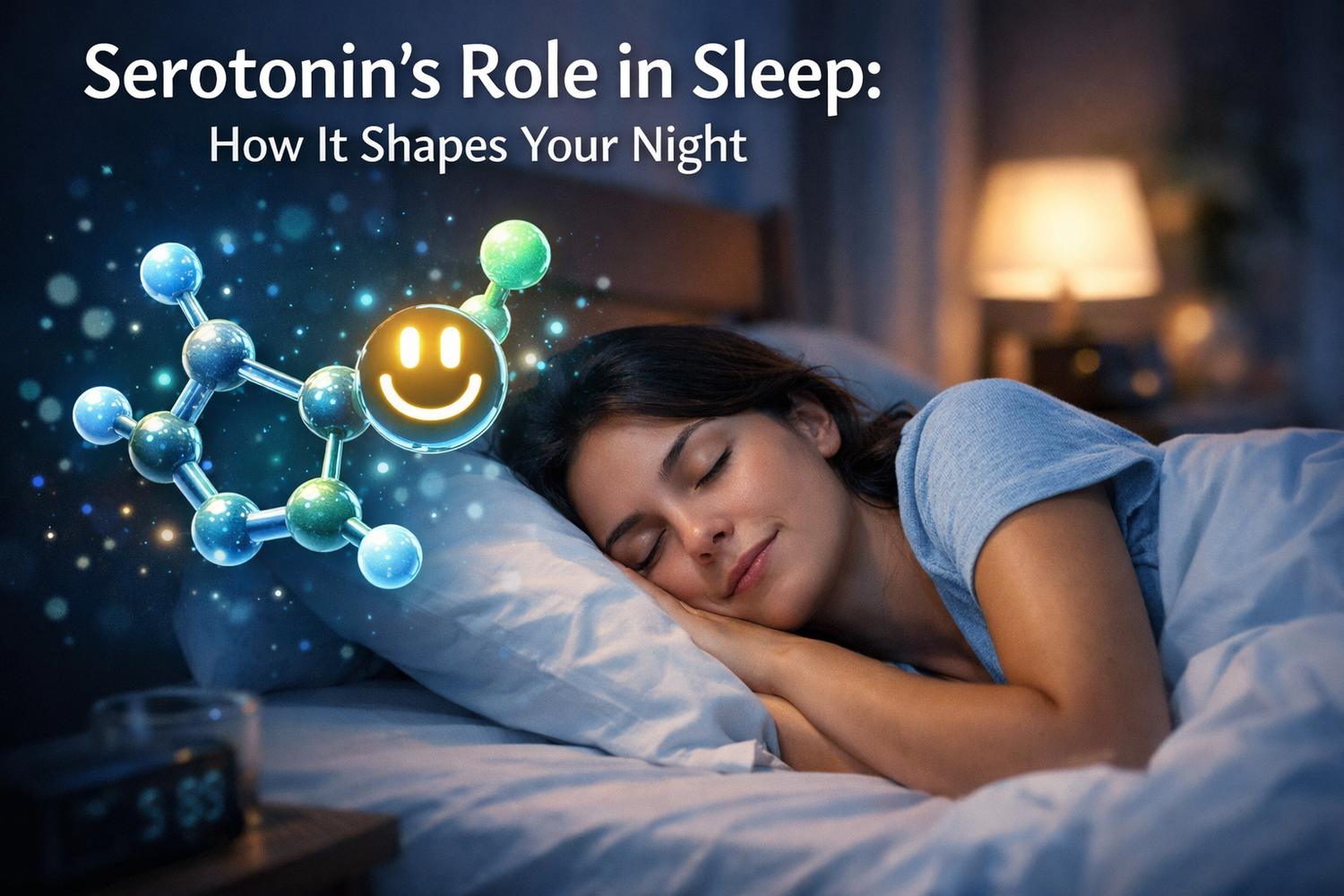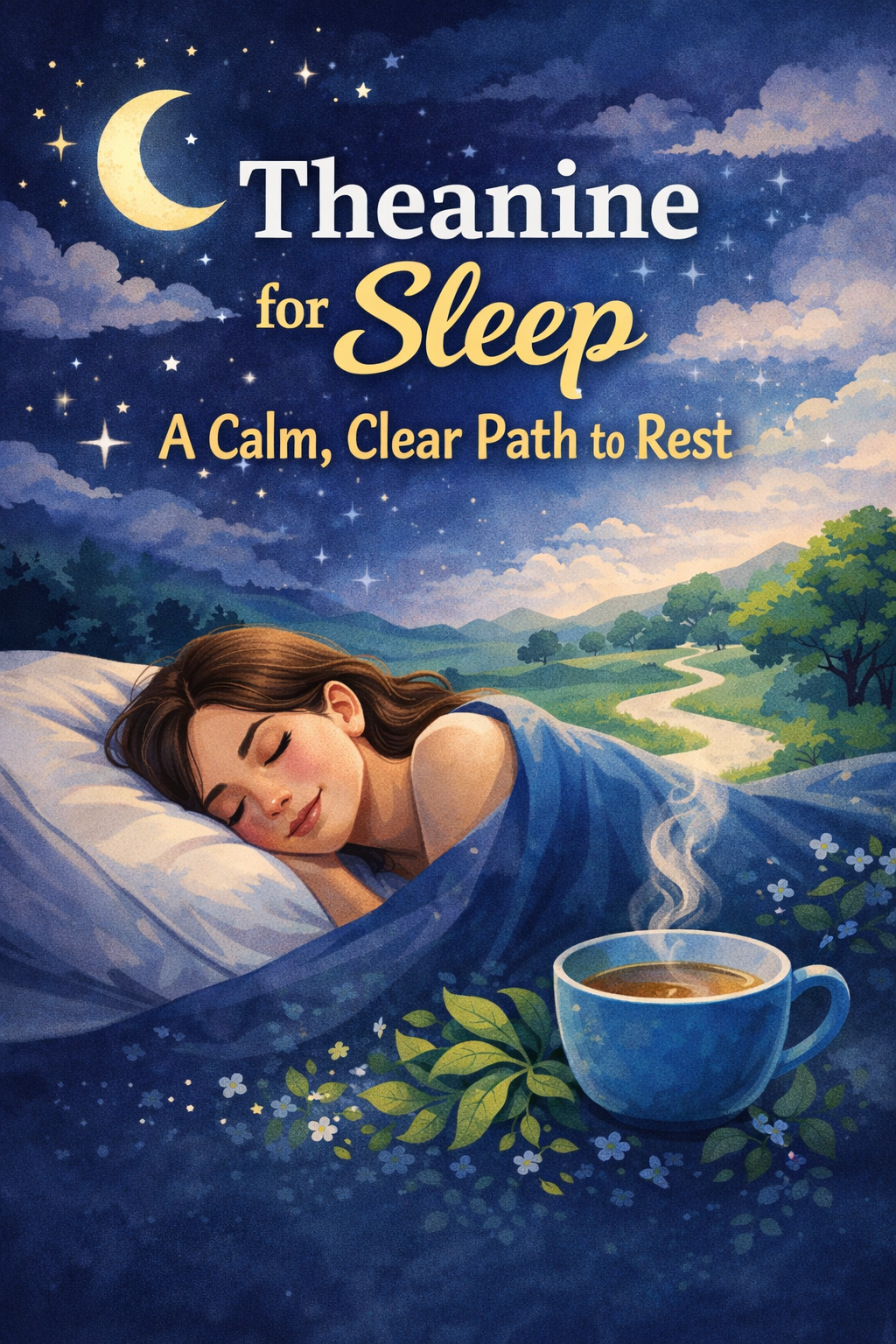Serotonin's Role In Sleep: Why This One Molecule Matters
Serotonin’s role in sleep sits at the intersection of biology, mood, and daily rhythm. This quiet chemical messenger shapes how easily you fall asleep, how deeply you rest, and how clear you feel the next day. When serotonin signaling is steady, the brain is more likely to rotate smoothly through light sleep, deeper sleep, and dreaming. When it’s off, nights fragment, mornings feel heavy, and stress lingers.
This article explores the science of serotonin’s role in sleep in a grounded, accessible way. You’ll see how one brainstem region times your “sleep pressure,” how serotonin turns into melatonin, why certain receptors matter for deep, slow-wave sleep, and how lifestyle, supplements, and medications interact with this system. Along the way, we’ll touch on SLP1 resources—such as Reclaim Your Sleep: The SLP1 Protocol for Moms to Win Their Sleep Back—built around this same science.
“Sleep is the single most effective thing we can do to reset our brain and body health each day.” — Matthew Walker, PhD
What Serotonin Is And How It Connects To Sleep

Serotonin, or 5-hydroxytryptamine (5‑HT), is a neurotransmitter made from the amino acid tryptophan. Most people know it as a “mood chemical,” but its reach is broader. It influences appetite, digestion, pain, temperature regulation, and, very directly, sleep.
Inside the brain, serotonin acts as a signal between neurons. Outside the brain, especially in the gut, it shapes motility and communicates back to the central nervous system through the gut–brain axis. This wide distribution is one reason serotonin’s role in sleep feels so tied to both emotional state and physical comfort.
Two features matter most for sleep:
-
Serotonin As Melatonin’s Precursor
In the pineal gland, serotonin is converted into melatonin after dark. Melatonin is the hormone that tells your body, “Night has arrived.” Without adequate serotonin available to that pineal “factory,” melatonin production can fall short, making it harder to fall asleep and reach deeper sleep. -
Serotonin As A Regulator Of Arousal And Calm
In the brain, different serotonin receptors either quiet or activate neural networks. This means serotonin can both promote waking alertness and prepare the brain to disengage into sleep, depending on which receptors are signaling.
If you enjoy digging into neurobiology, SLP1’s page on the science expands on these pathways and how they relate to real-world sleep challenges.
The Raphe Nuclei: Where Serotonin Sleep Signaling Begins
To understand serotonin’s role in sleep, you need to meet a small but influential region of the brainstem: the raphe nuclei.
The Brain’s Serotonin Hub
The dorsal raphe nucleus (DRN), part of the raphe complex, is the main source of serotonin projections to:
-
The cerebral cortex (thinking, awareness)
-
The thalamus (sensory relay)
-
The hypothalamus (hormones, temperature, circadian timing)
-
The basal forebrain (arousal)
-
The amygdala (emotion)
From this one hub, serotonin spreads widely, setting the tone for both wakefulness and rest.
The Paradox: Most Active When You’re Awake
Electrophysiological research shows that serotonergic neurons in the raphe fire fastest when you are awake, slow down during non-REM sleep, and nearly fall silent in REM sleep. At first glance, that pattern suggested serotonin was mainly a “wake” chemical.
But animal experiments complicate that story:
-
Genetic loss of serotonin in zebrafish
When zebrafish were engineered so their raphe neurons could not produce serotonin, they slept about half as much as normal fish. -
Complete removal of raphe neurons in zebrafish and mice
Ablating these neurons led to striking reductions in total sleep time. -
Optogenetic activation
When scientists used light to activate raphe neurons in genetically modified zebrafish and mice, they could induce sleep—but only if the animals were capable of making serotonin. If serotonin synthesis was blocked, activating the neurons had no sleep effect.
Taken together, these findings show that serotonin made and released from the raphe nuclei is not optional. It is necessary for the brain to generate normal amounts of sleep.
Serotonin And Homeostatic Sleep Pressure
So how can neurons that are most active during waking still promote sleep? The answer lies in homeostatic sleep pressure—the internal drive to sleep that builds the longer you stay awake.
Two Forces Shaping Your Sleep
Your sleep is guided by two main forces:
-
Circadian rhythm – The 24-hour clock aligning you with light and dark.
-
Homeostatic sleep pressure – The “sleep debt” that accumulates during wakefulness.
Serotonin’s role in sleep sits squarely in the second system.
How Serotonin Builds Sleep Drive
The leading theory is that steady firing of raphe neurons during the day gradually loads the brain with sleep pressure:
-
As you stay awake, serotonergic neurons in the raphe keep releasing serotonin at low, sustained levels.
-
This ongoing activity, repeated over hours, sends a mounting signal: the longer the wake time, the stronger the internal need for sleep.
-
When sleep finally begins, this built-up pressure is discharged, especially through deep, slow-wave stages—what many people describe subjectively as deeper sleep.
When serotonin signaling from the raphe is impaired—by genetic changes, chronic stress, or medications—sleep pressure may not build properly. That can produce a pattern of:
-
Reduced deep sleep
-
Shorter total sleep or less refreshing sleep
-
Strong daytime sleepiness, despite time in bed
This explains why serotonin’s role in sleep can look paradoxical. Too little serotonin can be linked to insomnia in some studies and lethargy in others. The common thread is disrupted sleep pressure and fragmented rest, not a simple “more or less sleep” story.
Serotonin, Circadian Rhythms, And Melatonin

While homeostatic sleep pressure builds through the day, the circadian clock tells you when that pressure will actually be released as sleep. Serotonin is woven into this timing system too.
Light, Serotonin, And The Brain’s Clock
In the hypothalamus, the suprachiasmatic nucleus (SCN) acts as the master clock. Light hitting the retina signals the SCN, which then adjusts circadian rhythms across the body.
Serotonin interacts with this process in two main ways:
-
Daytime light exposure stimulates serotonin production, supporting alertness and mood, while research on how sleep affects mental health demonstrates the bidirectional relationship between these systems.
-
Serotonin feedback to the SCN helps keep the clock aligned with the 24-hour light–dark cycle.
When evening comes and light fades, the brain begins to shift from serotonin-dominant signaling toward melatonin.
“Every organ in your body runs on a clock, and those clocks need regular light–dark signals to stay in sync.” — Russell Foster, PhD, circadian neuroscientist
From Serotonin To Melatonin
In the pineal gland, serotonin becomes the raw material for melatonin production. As darkness deepens:
-
Serotonin is enzymatically converted into melatonin.
-
Melatonin rises in the bloodstream and brain.
-
The body lowers core temperature and prepares to get to sleep and then move into deeper sleep.
If serotonin levels are inadequate or poorly timed, melatonin output may be blunted or shifted, leading to:
-
Difficulty falling asleep at a consistent time
-
Mixed signals between feeling tired and feeling wired
-
Shallow, non-restorative sleep despite hours in bed
SLP1 resources such as Melatonin Nasal Spray: A Comprehensive Guide explore how directly supplying melatonin—especially via nasal delivery—can bypass some of these upstream disruptions in serotonin signaling.
Serotonin Receptors And Sleep Architecture
Serotonin’s role in sleep is not just about how much of the chemical is present. It also depends on which receptors it activates. There are at least seven major receptor families (5‑HT₁ to 5‑HT₇), many with subtypes. Several are especially important for sleep architecture—the pattern of light sleep, deep sleep, and REM across the night.
5‑HT₁A And 5‑HT₁B: Tuning REM And Wakefulness
5‑HT₁A and 5‑HT₁B receptors generally inhibit the neurons they sit on.
-
When 5‑HT₁A agonists are infused directly into the dorsal raphe, they quiet serotonin neurons and can increase REM sleep locally.
-
When the same drugs are given systemically, they act at many brain sites and tend to increase wakefulness while reducing both slow-wave sleep and REM.
-
Mice lacking 5‑HT₁A or 5‑HT₁B receptors show more REM sleep, suggesting that normal 5‑HT₁ signaling usually helps keep REM in check.
5‑HT₂A And 5‑HT₂C: Gatekeepers Of Deep Sleep
5‑HT₂A and 5‑HT₂C receptors usually excite the cells they inhabit.
-
Systemic activation with 5‑HT₂ agonists increases wakefulness and reduces both slow-wave sleep and REM.
-
Knockout mice missing these receptors show abnormal wake–sleep patterns and less deep slow-wave sleep.
-
Drugs that block 5‑HT₂A (antagonists or inverse agonists) consistently increase slow-wave sleep in both animals and humans, while modestly reducing REM and wakefulness.
This last point has big implications for anyone who rarely feels like they enter truly deeper sleep. 5‑HT₂A antagonists can deepen the non-REM portion of the night, sometimes even when traditional sleeping pills fail to restore that depth.
5‑HT₃ And 5‑HT₇: Shaping REM And Arousal
-
5‑HT₃ receptors are ion channels; when serotonin activates them, cells depolarize quickly. Agonists at these receptors tend to reduce REM sleep and promote waking.
-
5‑HT₇ receptors are excitatory and tied to REM regulation. Mice lacking 5‑HT₇ spend less time in REM; agonists that stimulate 5‑HT₇ often increase wakefulness and suppress REM.
You can summarize some of these effects this way:
|
Receptor Family |
Usual Effect On Cells |
Typical Impact On Sleep |
|---|---|---|
|
5‑HT₁A / 5‑HT₁B |
Inhibitory |
Limits REM, can support wakefulness |
|
5‑HT₂A / 5‑HT₂C |
Excitatory |
Promotes wake, reduces deep sleep and REM |
|
5‑HT₃ |
Excitatory (ion channel) |
Promotes arousal, reduces REM |
|
5‑HT₇ |
Excitatory |
Shapes REM, often reduces it when absent |
Seeing serotonin’s role in sleep through the lens of receptor subtypes clarifies why different drugs, all acting on serotonin, can have very different—and sometimes opposite—effects on how you sleep.
When Serotonin Is Out Of Balance: Insomnia, Fragmented Sleep, And Mood
Because serotonin helps build sleep pressure, synchronize circadian rhythms, and set sleep architecture, disturbances in its signaling tend to show up as quality issues:
-
You fall asleep but wake frequently.
-
You sleep “enough hours” yet feel unrefreshed.
-
You lie awake for long stretches with racing thoughts.
-
Daytime fatigue and low mood reinforce each other.
Serotonin, Depression, And Sleep
Sleep problems and mood disorders frequently travel together. Twin studies suggest that when depression and insomnia co-occur, more than half of the vulnerability is shared genetically. Serotonin pathways are a strong candidate for this overlap.
One well-studied example:
-
A variation in the gene for the 5‑HT₂A receptor is linked both to depression with suicidal ideation and to altered slow-wave sleep.
-
Since blocking 5‑HT₂A improves deep sleep while receptor dysfunction harms mood, this receptor appears to sit at a crossroads between emotional stability and restorative sleep.
This helps explain why some people feel caught in a feedback loop: poor sleep worsens mood, and low mood erodes sleep.
For many mothers, this loop is especially intense after childbirth. Hormonal shifts, night feedings, and stress can disturb serotonin rhythms. SLP1’s Reclaim Your Sleep: The SLP1 Protocol for Moms to Win Their Sleep Back speaks directly to this pattern, weaving emotional support with strategies rooted in serotonin’s role in sleep.
SSRIs And Sleep Side Effects
Selective Serotonin Reuptake Inhibitors (SSRIs) increase serotonin availability in the brain. They are helpful for many people with depression, but they can also:
-
Reduce REM sleep
-
Cause insomnia or restless sleep in the short term
-
Occasionally lead to vivid dreams or nighttime awakenings
These effects reflect broad stimulation of serotonin receptors—especially those that favor wakefulness or suppress REM. Understanding this helps set realistic expectations and encourages close collaboration with a prescribing clinician if sleep side effects arise.
Lifestyle, Diet, And Natural Support For Serotonin's Role In Sleep

While medication decisions belong with your healthcare provider, many elements of serotonin’s role in sleep are shaped daily by your behavior. Think of these as gentle levers that nudge the system toward balance.
Nourishing Serotonin With Food

Serotonin is made from tryptophan, an essential amino acid that must come from your diet. Helpful sources include:
-
Protein-rich foods
Turkey, chicken, eggs, salmon, tofu, and other soy products provide tryptophan. -
Complex carbohydrates
Brown rice, oats, and sweet potatoes support tryptophan transport into the brain, especially when paired with protein. -
Supportive snacks
Bananas, nuts, seeds, and a small amount of dark chocolate can complement evening meals, while studies like the effect of tart cherry on sleep quality have examined how specific foods influence serotonin-melatonin pathways.
Micronutrients also matter:
-
Vitamin B₆ (in chickpeas, potatoes, bananas) helps convert tryptophan into serotonin.
-
Magnesium (in leafy greens, pumpkin seeds, almonds) calms the nervous system and supports serotonin receptor function.
SLP1’s Glycine for Sleep: A Comprehensive Guide discusses glycine—an amino acid that lowers core body temperature and encourages relaxation. While glycine acts through different receptors than serotonin, it pairs well with serotonin-friendly nutrition to support deeper sleep.
Light, Movement, And Daily Rhythm
Serotonin’s role in sleep is also tuned by your daytime rhythm:
-
Morning light
Spend 10–30 minutes in natural light soon after waking. This boosts daytime serotonin and anchors your circadian clock, making it easier to get to sleep at night. -
Regular movement
Moderate physical activity—walking, yoga, cycling, strength training—raises serotonin, lowers stress hormones, and improves slow-wave sleep over time. -
Consistent sleep–wake times
Going to bed and waking within the same 60–90 minute window each day helps both serotonin and melatonin follow predictable patterns.
These habits are core elements of protocols like Reclaim Your Sleep: The SLP1 Protocol, which connects day structure with night restoration.
Stress, The HPA Axis, And Calming The System
Chronic stress activates the hypothalamic–pituitary–adrenal (HPA) axis, elevating cortisol. High, prolonged cortisol can:
-
Suppress serotonin synthesis
-
Disrupt its conversion into melatonin
-
Fragment sleep architecture
From the perspective of the science, stress is not just psychological; it is biochemical. Helpful counterweights include:
-
Mindfulness or breathing practices before bed
-
Gentle evening stretching or restorative yoga
-
Setting a “digital sunset” time to step away from email and screens
Natural supports such as reishi mushroom—explored in The Sleep-Enhancing Powers of Reishi Mushroom—may also ease stress reactivity and indirectly support serotonin-related pathways.
Supplements And Tools: When You Need Extra Help
Some people find that, once lifestyle basics are in place, targeted supplements add another layer of support for serotonin’s role in sleep:
-
5‑HTP (5‑hydroxytryptophan) – A direct serotonin precursor used by some under medical guidance.
-
Glycine – As detailed in Glycine for Sleep: A Comprehensive Guide, it promotes relaxation and can deepen certain sleep stages.
-
Reishi mushroom – Often used for its calming, adaptogenic properties; discussed in The Sleep-Enhancing Powers of Reishi Mushroom.
-
Melatonin and melatonin nasal sprays – Products reviewed in Melatonin Nasal Spray: A Comprehensive Guide can support melatonin levels when the serotonin–melatonin handoff is disrupted.
Formulas like SLP1’s deeper sleep blends are designed with these interactions in mind. As always, it’s wise to talk with a health professional before combining supplements with prescription medications.
Medications Targeting Serotonin And Their Sleep Effects
Beyond SSRIs, other medications explicitly target serotonin receptors to influence sleep.
5‑HT₂A Antagonists: Deep Sleep–Focused Therapies
Given the role of 5‑HT₂A receptors in promoting wakefulness and reducing deep sleep, researchers have explored drugs that block these receptors:
-
Broad 5‑HT₂A/2C antagonists (like ritanserin) increase slow-wave sleep and reduce wakefulness.
-
Newer, more selective 5‑HT₂A antagonists and inverse agonists (such as volinanserin or APD‑125) show similar effects, with clear increases in deep, restorative slow-wave sleep.
This is particularly interesting because many standard sleep medications—like benzodiazepines and “Z‑drugs” (zolpidem, eszopiclone, etc.)—can reduce deep sleep, even while helping you fall asleep.
A promising strategy emerging from the science is:
-
Combination therapy – Pairing a traditional hypnotic (for sleep onset and maintenance) with a 5‑HT₂A antagonist (to preserve or deepen slow-wave sleep).
For people who can fall asleep but rarely feel rested, this receptor-specific focus on deep sleep may be more aligned with what the body is actually missing.
Why This Matters For Everyday Choices
You may never take a 5‑HT₂A antagonist, but understanding serotonin’s role in sleep at this level has practical value:
-
It explains why some medications leave you sedated yet unrefreshed.
-
It highlights why “more serotonin” is not always better; where and how it acts is just as important.
-
It underscores the need to work with, not against, the brain’s own architecture of light sleep, deeper sleep, and REM.
Practical Ways To Work With Serotonin's Role In Sleep Tonight
You don’t need a lab to begin working with serotonin’s role in sleep. You can start with a few grounded steps:
-
Anchor Your Morning
Step into natural light soon after waking. Even 10–15 minutes supports daytime serotonin and helps you get to sleep at a more consistent hour. -
Prioritize An Evening Wind-Down
Reserve the last 45–60 minutes before bed for low-stimulation activities: reading, gentle stretching, or quiet conversation. This allows serotonin signaling to shift away from daytime arousal toward night-time calm. -
Build A Serotonin-Friendly Dinner
Include a tryptophan-rich protein (such as turkey or eggs) plus a modest portion of complex carbohydrates. Over time, this can support the serotonin–melatonin pathway that underlies deeper sleep. -
Experiment With Calming Nutrients
Under guidance, consider supports highlighted in Glycine for Sleep: A Comprehensive Guide or The Sleep-Enhancing Powers of Reishi Mushroom if stress is a major part of your sleep picture. -
Protect Sleep From Persistent Stress
Choose one simple practice—five minutes of breathing, a short journal entry, or a quiet walk—to signal to your nervous system that the day is closing. -
Get Curious About Your Own Data
If you like objective insight, review resources on the science and consider tracking patterns: what you eat, how much light you get, how you move, and how you feel upon waking. -
Seek Structured Guidance If Needed
If sleep struggles are chronic, look to frameworks like Reclaim Your Sleep: The SLP1 Protocol for Moms to Win Their Sleep Back or to professional support. Serotonin’s role in sleep is powerful, but it is also modifiable.
Conclusion: A Calmer View Of Serotonin And Your Night
Serotonin’s role in sleep is both subtle and profound. It helps your brain count the hours you’ve been awake, shapes how your internal clock reads light and darkness, becomes the raw material for melatonin, and, through its many receptors, sculpts the balance between light sleep, deeper sleep, and vivid dreams.
When this system is steady, nights tend to feel continuous and restorative. When it is strained—by stress, irregular schedules, nutritional gaps, or medication effects—sleep often becomes lighter, more fragmented, and less satisfying. The good news is that many of the levers that influence serotonin’s role in sleep are within reach: light, movement, food, stress relief, and thoughtfully chosen supports.
By pairing practical steps with an understanding of the science, you create conditions for your brain’s own chemistry to do what it is wired to do: carry you from wakefulness into real rest, and back again, with greater ease.



Leave a comment
This site is protected by hCaptcha and the hCaptcha Privacy Policy and Terms of Service apply.